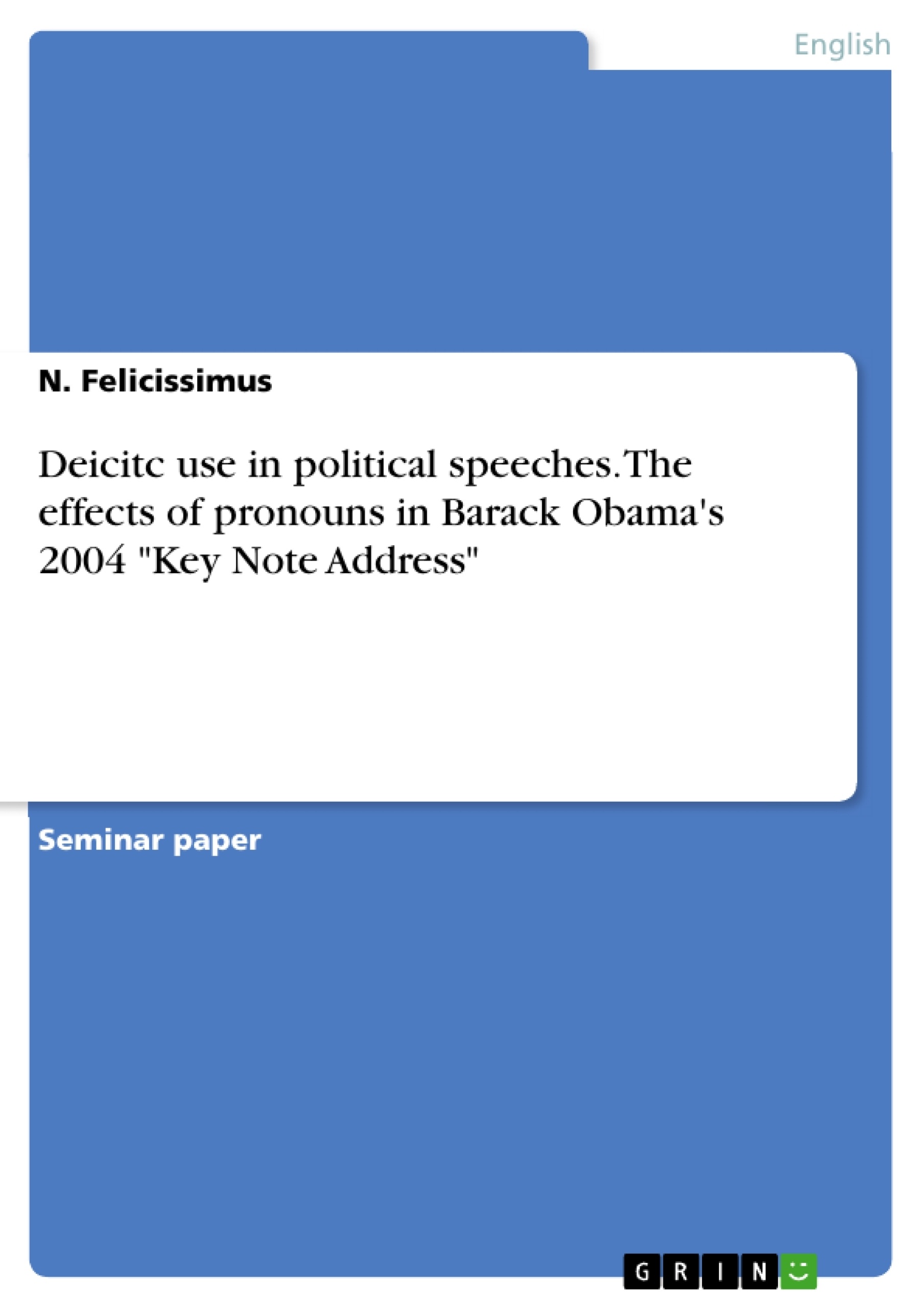“Political language is designed to make lies sound truthful and murder respectable, and to give an appearance of solidity to pure wind.” (Orwell 9). Orwell has a very critical view on the potential dangers of language that can lead to persuasion and deception. Political speeches in particular can be examined under certain pragmatic aspects in order to find out the speaker’s intention.
With this in mind, the effect of pronouns in political speeches will be considered in the pages that follow. At first sight, the use of pronouns does not seem to suit to Orwell’s radical and immoral understanding of political language. This paper will illustrate that the choice of single linguistic units as pronouns can have a great effect on the listeners and recipients. How can atmosphere be created, political groups compared and distinguished and how can ideas and ideologies be conveyed and intensified by the judicious use of pronouns?
There is a number of linguists who have already dealt with the topic of pronouns in political discourse. Among the first were Brown and Gilman with their famous article “The Pronouns of Power and Solidarity” (1960).
A newer approach was taken by John Wilson thirty years later when he linked pronouns to political language (Wilson 1990). Pennycook points out the difficulties and meaning of pronouns in a paper called “The Politics of Pronouns” (1994) which will be one of the basic resources of my investigations.
In this paper, the use of pronouns will be examined within the scope of Barack Obama’s keynote address in 2004 since this speech made him famous far beyond Illinois, where he was senator during that time. His famous slogan “Yes we can” which he developed after that speech reflects the galvanizing power of the single pronoun "We" over a whole nation.
Inhaltsverzeichnis (Table of Contents)
- 1 Introduction
- 2 Pronouns in Political Speeches
- 2.1 Political Discourse
- 2.2. The characteristics of deictic use
- 2.3 The function of deixis in Obama's speech..
- 2.3.1 Summary of the speech
- 2.3.2 A sense of belonging.
- 2.3.3 Construction of the Other.....
- 3 Conclusion........
Zielsetzung und Themenschwerpunkte (Objectives and Key Themes)
This paper aims to examine the effect of pronouns in political speeches by analyzing Barack Obama's keynote address in 2004. Specifically, it explores how the use of pronouns can influence the audience and create an atmosphere, compare and distinguish political groups, and convey and intensify ideas and ideologies.
- The use of pronouns in political discourse
- The role of deixis in creating a sense of belonging and constructing "the other"
- The power of pronouns to influence audience reception and perception
- The impact of pronominal choices on the conveyance of ideas and ideologies
- The analysis of Obama's 2004 keynote address to illustrate the practical application of these concepts
Zusammenfassung der Kapitel (Chapter Summaries)
The first chapter introduces the topic of pronoun use in political speeches and provides a theoretical framework for understanding their effects. It highlights Orwell's view on the dangers of language in politics, emphasizing how political discourse can be used for persuasion and deception.
The second chapter delves into the broader context of political discourse, outlining the various aspects of this field and exploring the role of pronouns in creating a sense of solidarity and distinction. It also defines key terms like deixis, indexicality, and deictic center, setting the stage for the analysis of Obama's speech.
Schlüsselwörter (Keywords)
The key words and focus topics of this paper include political discourse, pronoun use, deixis, indexicality, pronominalisation, solidarity, "the other," political speeches, Barack Obama's 2004 keynote address, and the impact of language on audience reception.
Frequently Asked Questions
What is the main objective of this analysis of Obama's speech?
The paper examines how the strategic use of pronouns in Barack Obama’s 2004 keynote address influenced the audience, created a sense of belonging, and intensified political ideologies.
Why is the pronoun "We" considered so powerful in political discourse?
The pronoun "We" creates a sense of solidarity and collective identity. In Obama's case, it helped galvanize a nation by making listeners feel part of a shared mission, as seen in the later slogan "Yes we can."
What does the term "deixis" mean in this context?
Deixis refers to words (like pronouns) whose meaning depends on the context of the speaker. In political speeches, deictic expressions are used to define the speaker's position relative to the audience and opponents.
How can pronouns be used to construct "the other"?
By choosing specific pronouns, a speaker can distinguish between "us" (solidarity) and "them" (opposition), effectively creating a political boundary and defining who belongs to their group and who does not.
What was Orwell's view on political language mentioned in the paper?
George Orwell was critical of political language, viewing it as a tool for persuasion and deception designed to make "lies sound truthful" and give "solidity to pure wind."
Which linguistic researchers have influenced this study?
The study draws on the work of Brown and Gilman (solidarity), John Wilson (political language), and Pennycook (the politics of pronouns).
- Citation du texte
- N. Felicissimus (Auteur), 2014, Deicitc use in political speeches. The effects of pronouns in Barack Obama's 2004 "Key Note Address", Munich, GRIN Verlag, https://www.grin.com/document/377799



